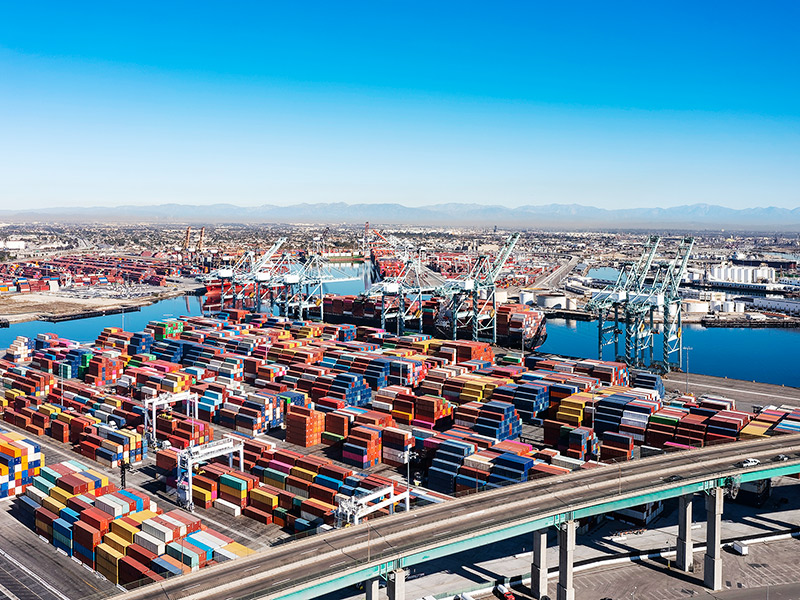
Authors
Businesses today are facing tough decisions on how to protect their financial viability, serve rapidly changing customer needs, and protect their workforce. The COVID-19 pandemic continues to alter the landscape of the global workforce, forcing millions of vulnerable workers out of work and requiring businesses to make quick and difficult decisions on retaining their workforce and supporting their supply chains through the crisis.
When exploring cost-cutting measures, businesses may unwittingly overlook the human rights impacts of their quick decisions, especially on the most vulnerable workers deep in their supply chain. Through our work addressing modern slavery across supply chains, we have observed an alarming uptick in business actions during this time that may lead to more individuals being forced into conditions of modern slavery, or on the brink thereof. In a joint statement, the Global Business Coalition against Human Trafficking (GBCAT) has urged companies to protect workforces against modern slavery risks when responding to COVID-19.
Below are three key areas in which BSR has noted increased risks of modern slavery:
1. Essential businesses may be inadvertently exposing workers to conditions of forced labor.
Workers who have been able to maintain their jobs with essential businesses may face increased risk of exploitative labor conditions as they experience heightened pressure to work long hours in response to the global demand for goods or to maintain productivity levels despite a reduced workforce. For example, technology companies supporting governments to build digital infrastructure related to COVID-19 or companies producing goods in response to global demand may in their haste subject their own workers and supply chain workers to long hours with little or no overtime pay, which in severe circumstances may amount to forced labor. The use of forced labor has already been well-documented in the production of healthcare products, from masks to surgical instruments, hospital textiles, and rubber gloves.
2. Canceling or delaying purchasing orders may result in supply chain workers losing their livelihoods and accepting precarious work.
Mass order cancellations, non-payment of orders, workforce cuts, and factory shutdowns pose serious repercussions for supply chain workers, many of whom already live below the poverty line. For example, in Bangladesh’s textile industry alone, one million workers already have lost their jobs. Unpaid wages and job losses, particularly in the developing world, make individuals desperate for alternative means of income and more likely to accept precarious and even exploitative work. Women, who represent the majority of low wage workers, are more likely to be unemployed and are particularly susceptible to sexual exploitation or sex trafficking. Migrant workers also may face a heightened risk of debt bondage since many are unable to pay off loans they took out in order to secure a job abroad. Forced into mandatory quarantine once they return home and now unemployed, workers may be forced to take on new debt to cover basic necessities for themselves and their families. Some may continue to borrow, digging deeper in debt, while others may even have family members or children working to pay off their loan.
3. As the economy recovers, rush orders can create or exacerbate situations of modern slavery in supply chains.
As COVID-19 restrictions ease and businesses recover, business should be attuned to how practices such as tight production windows, last-minute orders and short-term contracts can create or contribute to abusive labor practices that may lead to forms of modern slavery. For example, meeting quick turnaround times or filling last minute orders for a client keen to kickstart financial recovery may subject supply chain workers to excessive working hours and unpaid overtime. In addition, if orders are too difficult to fulfill with the current workforce, suppliers may enlist local temporary workers to support, providing them with short-term contracts which offer little labor protection and limited remedy for abusive working conditions. As immigration restrictions are lifted, suppliers also may rely on labor brokers to provide migrant labor. In many cases, migrant workers are subjected to excessive and illegal recruitment fees, placing these new workers in situations of debt bondage. In all cases, extreme competition for jobs will make workers less likely to report abuses and accept working conditions, even the most exploitative.
Recommendations for Business
As businesses continue to respond and adapt to COVID-19 realities, they should continue to take a human rights-based approach to their decisions. Below are three key actions which businesses should take during and after COVID-19:
1. Conduct a hot-spot analysis of your operations and supply chain for modern slavery risks.
Businesses should conduct a modern slavery risk assessment to understand the parts of their operations and supply chains which may be most susceptible to modern slavery because of geographic or sector-related risks or because of factors that increase the vulnerability of workers (e.g. use of temporary or migrant workers), especially in light of COVID-19.
BSR has developed a Rapid Human Rights Due Diligence tool to help businesses assess potential and actual negative impacts of their business decisions. GBCAT’s new resource for business, entitled Addressing Forced Labor and Other Modern Slavery Risks: A Toolkit for Small and Medium-Sized Suppliers, enables suppliers to quickly identify areas of their business which carry the highest risk of modern slavery and formulate a plan to prevent and address identified risks.
2. Support suppliers in protecting their workers.
Businesses should honor existing contracts and consider extending payment and offering credit to vulnerable suppliers and exploring longer-term contracts to protect the financial viability of their suppliers. As work resumes, businesses should engage closely with suppliers and industry associations to discuss realistic timelines and pricing for the delivery of goods and services. Supporting the continuity of suppliers’ operations helps protect its workforce.
Businesses should also help suppliers to protect their own workforce directly if suppliers are financially unable to do so. This can include providing personal protective equipment (PPE) to supply chain workers and emphasizing the importance of implementing hygiene best practices and safe working conditions (e.g. modifying shifts and limiting workplace traffic). Some other avenues of support include offering to pay sick leave when not provided by the government, compensating workers who have been laid off, and offering emergency funds to workers. Businesses should also collaborate with industry associations or business associations to pool resources if practicable.
3. Provide channels for workers to raise concerns as they go back to work.
All workers should have access to an anonymous channel to raise concerns to their employer. This is of greater importance now, as some workers have expressed concerns that their employers have not provided them with appropriate PPE. Although travel restrictions inhibit a business’s ability to conduct on-site supplier assessments, businesses can ascertain the working conditions of supply chain workers through an anonymous hotline, direct virtual meetings with supply chain workers, or through online discussion boards where supply chain workers can report concerns and obtain information on their rights. If none of these channels currently exist and it is not practicable to implement them, a business should consider extending its own grievance channel to its supply chain workers.
Fostering open and regular communication with workers both internally and across the supply chain can help your business better understand emerging risks and explore ways to support the most vulnerable workers. Please join GBCAT members in condemning any and all forms of modern slavery and using your influence to help protect those that are most vulnerable during these challenging times.
Topics
Let’s talk about how BSR can help you to transform your business and achieve your sustainability goals.








